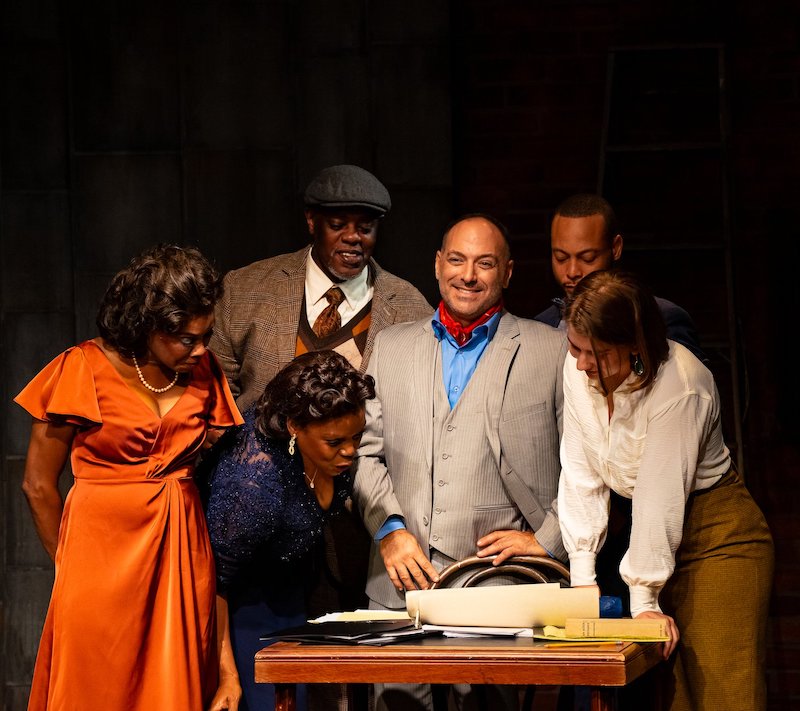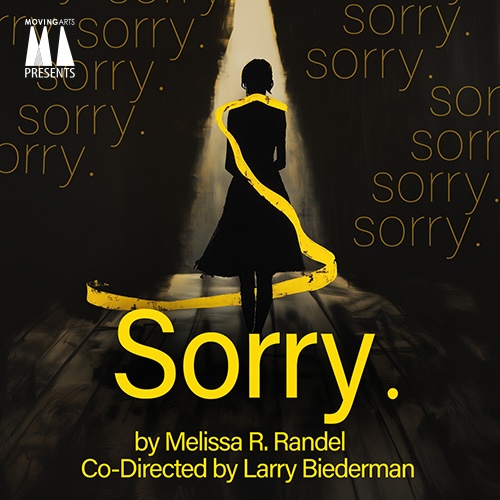
Kimi Walker, Lorinda Hawkins Smith, Rodrick Jean-Charles, Spencer Rowe, Freedom, Sophia Kalugin (Photo by Kamal Bolden)
Reviewed by Thatiana Smith
Actors Co-op
Thru Nov. 10
RECOMMENDED
This review is part of the Stage Raw/Unusual Suspects Youth Journalism Fellowship
Webster’s Dictionary defines a stereotype as “an idea or statement about all of the members of a group or all the instances of a situation.” Some stereotypes can be harmless while others, not so much. Trouble in Mind, written by Alice Childress and directed by Kimberly Hébert Gregory, explores the world of harmful stereotypes and typecasting. It’s a powerful message packed into two hours.
This play is a story of a play-within-a-play that tackles the themes race and art, in a 1950’s Broadway theater.
Wiletta Mayer (Kimi Walker) is an accomplished actress who cannot wait to make her Broadway debut in Chaos in Belleville, the story of Black Americans written by a White man. According to the show’s director, Kimberly Hébert-Gregory, “She (Wiletta) hopes that this play and experience will be the ‘progressive’ work it was billed to be.” As one knows, the 1950s were not known for being “progressive,” when producing Black stories. The play highlights the disparity Black artists faced when expressing themselves in their work. They don’t want to be a sob story; they want to move forward while not forgetting their ancestors who fought for freedom.
(As I watched this play, I couldn’t help but feel grateful for how far we’ve come as a society. Nowadays we have many outstanding Black artists who show the rest of the world the authentic Black experience.)
The entire cast does a phenomenal job. Dealing with such a complex and heavy topic for Black and White actors deserves some recognition. I’d like to highlight Rodrick Jean-Charles’s portrayal of Sheldon Forrester: Sheldon is a character some might call an “Uncle Tom,” a Black person all-too-eager to gain the approval of White people. While that’s true in the first act, the second act gives him the character arc he deserves.
Jean-Charles caused something within me to stir. As I sat in the audience, I couldn’t help but be transfixed by his character. His lines were simple, but they meant something. Then, he was finally given his show-stealing monologue in the second act. Jean-Charles’s delivery makes one sympathetic not only to the character but also to everyone in that show. This heavy topic was dealt with so well by the entire ensemble.
A play has many technical elements, and Wendell C. Charmichael’s costumes capture the major and minor details of a 1950’s wardrobe. From Eddie’s round glasses to Millie’s grand coat, there’s no doubt in your mind that the characters strolled into the theater from the cold New York City streets. When it comes to period pieces such as this, the little accessories matter, which is why Carmichael deserves applause.
While this show has so many significant elements, one thing needed more. The romantic chemistry between Black thespian John Nevins (Freedom) and White, Yale theater-grad Judy Sears (Sophia Kalugin) is nearly nonexistent in Act 1, though it seems to be written into the play. Kalugin and Freedom are excellent in other elements, but this one element was lacking. There needs to be more of a struggle between wanting to get closer to each other and knowing that it will cause a racial rift.
“Never judge a book by its cover” is a day-old saying but it still holds true to today. When one holds another person to a certain stereotype, they run the risk of being wrong, and in most cases they are. Trouble in Mind is an impactful play from which many can learn something about how they can be a better friend, neighbor, and companion to everyone in the world.
Actors Co-op David Schall Theatre, 1760 N. Gower St., Hollywood. Fri – Sat. 7:30pm, Sun. 2:30 pm.; thru Nov. 10. actorscoopboxoffice@gmail.com. Running time, two hours and 10 minutes, including intermission























